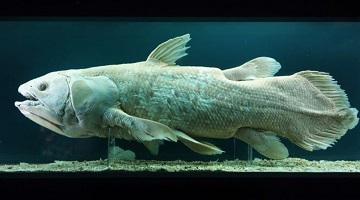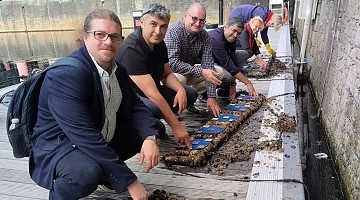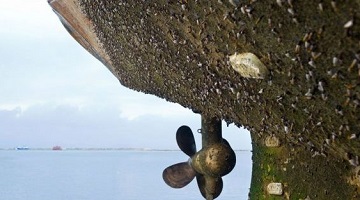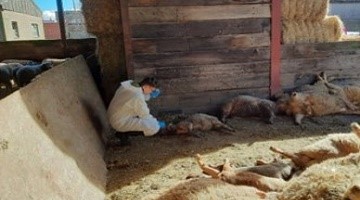Why study this course with LJMU?
- Accredited by the Royal Society of Biology
- Offers a range of optional modules such as Genes and Genomes, Developmental Biology, Immunology and Medical Microbiology and Neurobiology
- Opportunity for self-funded overseas field expedition – possible destination is Doñana National Park, Spain*
- Stepping stone to careers in diverse fields such as genetics, microbiology, embryology, clinical science, radiography and environmental sciences
- Option to choose between a year's work placement or a 135 hour work-based learning placement
- £6 million invested in state-of-the-art teaching facilities
- 95% of students surveyed said the teaching staff on this course were good at explaining things (National Student Survey 2024)
- 94% of students surveyed said academic support was good or very good (National Student Survey 2024)
About your course
The professionally-accredited BSc (Hons) Biology with foundation Year programme at Liverpool John Moores University opens up the fascinating subject of biology providing a core understanding of biological theory and practical skills, whilst giving you the opportunity to study a variety of specialisms, including genetics, microbiology, neurobiology, development and ecology. There are also exciting opportunities to complete exciting placements and overseas fieldwork.
About the Foundation Year
The Foundation Year is ideal if you have the ability to study for a degree but don't have the qualifications to enter directly onto the Biology honours degree programme. Once you pass the Foundation Year you will progress directly onto the first year of the honours degree. If you are a full-time UK student, you will qualify for student financial support for the full duration of your course (subject to eligibility criteria).
About BSc (Hons) Biology
At LJMU we recognise that, because of the vast array of subject areas within the field of biology, you may want to get a feel for which ones interest you most before specialising, which is why we keep the degree broad based in the first year. In the first year, you will typically cover core modules in Genetics and Evolution, Microbiology, Physiology, Ecology, Practical Skills for Biology and Fundamentals of Scientific Research.
In the second and third years, you can either continue to keep your degree broad based, or you can specialise by choosing optional modules from a wide range topics, which may include Genes and Genomes, Immunology, Medical Microbiology, Developmental Biology, Ecology Field Skills, Marine and Freshwater Biology and Applications of Genetics in Health and Disease.
There is a core residential UK field trip in Level 4* and students can also take part in an advanced field skills expedition during Level 6 – the possible destination is the Doñana National Park, Spain, where you can learn ecological and behavioural field work skills. Additionally, you have the chance to undertake a short 135 hour work-based learning placement or a year-long industrial placement. So, you will have plenty of opportunities to put what you have learnt into practice and acquire the transferable skills that employers look for.
Course modules
What you will study on this degree
Please note that your choice of options may be subject to timetabling constraints.
Further guidance on modules
Modules are designated core or optional in accordance with professional body requirements, as applicable, and LJMU’s Academic Framework Regulations. Whilst you are required to study core modules, optional modules provide you with an element of choice. Their availability may vary and will be subject to meeting minimum student numbers.
Where changes to modules are necessary these will be communicated as appropriate.
Core modules
Core modules
Core modules
Optional Modules
Core modules
Optional Modules
Professional accreditation/links
This programme has been accredited by the Royal Society of Biology following an independent and rigorous assessment. Accredited degree programmes contain a solid academic foundation in biological knowledge and key skills, and prepare graduates to address the needs of employers. The accreditation criteria require evidence that graduates from accredited programmes meet defined sets of learning outcomes, including subject knowledge, technical ability and transferable skills.
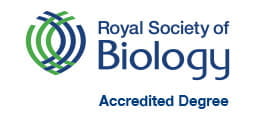
Your Learning Experience
Excellent facilities and learning resources
We adopt an active blended learning approach, meaning you will experience a combination of face-to-face and online learning during your time at LJMU. This enables you to experience a rich and diverse learning experience and engage fully with your studies.
Teaching is mostly via lectures, in-person laboratory practicals and field trips. Additionally, small tutorial sessions provide a forum for discussing course material more informally. You will also have progress review meetings with your personal tutor. Our approach ensures that you can easily access support from your personal tutor, either by meeting them on-campus or via a video call to suit your needs.
Formal teaching accounts for approximately 14-18 hours of your study time each week. You will be expected to spend the rest of your time in private study.
Work-related Learning
You have the opportunity to undertake a short (4-6 week) work-based placement or a 12-month placement with a relevant organisation in the UK or abroad. This will not only give you a chance to put into practice what you have learnt in the first two years, it will also help you develop your personal skills and add real value to your CV. Many students who undertake placements have gone on to work for the same organisation after they graduate.
Dedicated personal tutor, plus study skills support
Throughout your course you will have the support of a personal tutor who will be available to discuss course-related matters in both tutorial sessions and one-to-one progress review meetings. These meetings are to monitor your performance and identify action plans for improvement. A dedicated supervisor will also provide support during your research project.
The school is fully committed to promoting a learning environment that supports a culture of equality, diversity and inclusivity (EDI) and has a Disability Support Coordinator, an EDI Coordinator and a School EDI Working Group. Personal Tutors also play a vital role in promoting awareness of support services for students.
Assessment varies depending on the modules you choose, but will usually include a combination of exams and coursework.
Most modules are assessed by exam and coursework, and some via coursework only. All students perform differently depending on how they are assessed, which is why we use a combination of assessment methods. Exams may therefore include a range of question types e.g. multiple choice, short answer, interpretative, problem-based learning and essay. Coursework assessment could be in the form of phase tests, fieldwork/practical reports, data handling, oral presentations, poster presentations, group discussions, essays or the evaluation of your practical skills. These are based on individual assignments but some require group work.
Feedback on coursework assessments is normally provided within three weeks of submission and may be via Canvas, our Virtual Learning Environment, face-to-face or in writing. We believe that constructive feedback is vital in helping you identify your strengths as well as the areas where you may need to put in more work.
Where you will study
You will study at the Byrom Street site in the university's City Campus in the heart of Liverpool. You will have access to first class teaching facilities, laboratories and study areas. The Avril Robarts library is within easy walking distance and here you'll find all the information you need to support your studies.
Course tutors

Dr Kirstie Scott
Programme Leader
“I’m passionate about enhancing the student experience and ensuring Biology students feel like they belong to the scientific community”
“I’m passionate about enhancing the student experience and ensuring Biology students feel like they belong to the scientific community”
Dr Scott has a PhD in Environmental Forensic Science, which she completed at University College London, and an MA in Geography from the University of Oxford. Kirstie regularly publishes research articles and delivers guest lectures across the UK. She has also assisted police forces in the UK as an expert witness. Her research interests include forensic ecology – the application of environmental biology to crime investigations; the value of diatoms, microscopic algae, as forensic indicators; and developing molecular tools and approaches to address ecological and forensic questions. Kirstie incorporates research within her teaching through highlighting how biological approaches can be used to address important questions.


I enjoy how in-depth the course is. I have always loved Biology and getting to study it at such molecular and cellular levels is very interesting.
Career paths
Completing this BSc Biology programme will open up a vast range of career opportunities.
Biology graduates have gone into employment in a wide range of roles, including clinical science, embryology, research and development laboratories, microbiological food and water safety or ecological roles. Our graduates work at a number of organisations including: the NHS (various roles including the Scientist Training Programme), Astra Zeneca, Unilever, UK Health Security Agency, Axion Veterinary Laboratories, Francis Crick Institute, MedImmune, Eurofins Forensics, Elucigene Diagnostics, The Christie Hospital; conservation organisations including Chester Zoo, Brecknock Wildlife Trust and Operation Wallacea; and environmental agencies, such as Natural England and Kingfisher Environmental Services. Some prefer to continue their studies with postgraduate study (PGCE/PGDE, MSc, MPhil, MRes or PhD) in topics as wide ranging as human nutrition, oncology, molecular medicine, tropical medicine and embryology, or others go into teaching and lecturing.
Student Futures - Careers, Employability and Enterprise Service
A wide range of opportunities and support is available to you, within and beyond your course, to ensure our students experience a transformation in their career trajectory. Every undergraduate curriculum includes Future Focus during Level 4, an e-learning resource and workshop designed to help you to develop your talents, passion and purpose.
Every student has access to Careers Zone 24/7, LJMU's suite of online Apps, resources and jobs board via the LJMU Student Futures website.
Tuition fees and funding
- Full-time per year:
- £9,535
- Placement year:
- £1,905
The University reserves the right to increase tuition fees in accordance with any changes to the maximum allowable fees set by the UK Parliament. In the event of such a change, any fee increase will be subject to a maximum cap of 10% of the total course cost as originally stated at the time of your offer.
The fees quoted above cover registration, tuition, supervision, assessment and examinations as well as:
- library membership with access to printed, multimedia and digital resources
- access to programme-appropriate software
- library and student IT support
- free on-campus wifi via eduroam
Additional costs
Although not all of the following are compulsory/relevant, you should keep in mind the costs of:
- accommodation and living expenditure
- books (should you wish to have your own copies)
- printing, photocopying and stationery
- PC/laptop (should you prefer to purchase your own for independent study and online learning activities)
- mobile phone/tablet (to access online services)
- field trips (travel and activity costs)
- placements (travel expenses and living costs)
- student visas (international students only)
- study abroad opportunities (travel costs, accommodation, visas and immunisations)
- academic conferences (travel costs)
- professional-body membership
- graduation (gown hire etc)
Funding
There are many ways to fund study for home and international students. From loans to International Scholarships and subject-specific funding, you'll find all of the information you need on our specialist funding pages.
* Practical and field activities underpin all programmes in the School. PPE is provided for all necessary practical work. There are no costs for day field trips for core and optional modules. Residential field trips associated with the Level 4 core module include all travel and accommodation costs. Any residential field trips for optional modules will have costs involved. Locations may be subject to change and also subject to national and international travel restrictions.
A DBS check is not required for your application, however a DBS may be required for modules where there is a work based learning placement option. Work based learning placements that do not require a DBS check are available.
Entry requirements
Please choose your qualifications below to view requirements
Grades/points required from qualifications: DDD - CDD (72 - 80)
Work out how many UCAS points your qualifications are worth by visiting the UCAS Tariff Calculator.
Qualification requirements
How to apply
Securing your place at LJMU
UCAS is the official application route for our full-time undergraduate courses. Further information on the UCAS application process can be found here https://www.ljmu.ac.uk/study/undergraduate-students/how-to-apply.
Your university life
From accommodation and academic support to clubs and societies. Find out what LJMU has to offer.
Related Links
Talk to our students
Connect with a current LJMU student for advice and guidance on university life, courses and more.
See what our students are saying
At LJMU we want you to know you're making the right choice by studying with us. You can see what our students are saying about their experience with us through their reviews on the following websites:
Related Links
News and views
Browse through the latest news and stories from the university
The university reserves the right to withdraw or make alterations to a course and facilities if necessary; this may be because such changes are deemed to be beneficial to students, are minor in nature and unlikely to impact negatively upon students or become necessary due to circumstances beyond the control of the university. Where this does happen, the university operates a policy of consultation, advice and support to all enrolled students affected by the proposed change to their course or module.
Further information on the terms and conditions of any offer made, our admissions policy and the complaints and appeals process.





























